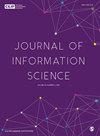Wildfire risk weighting and behaviour prediction using open geospatial data and ontologies
IF 1.7
4区 管理学
Q3 COMPUTER SCIENCE, INFORMATION SYSTEMS
引用次数: 0
Abstract
This article presents a novel approach to wildfire risk assessment and behaviour prediction by leveraging open geospatial data and ontologies. The proposed methodology includes a spatially weighted index model and multicriteria analysis to represent the risk of forest fires in the affected area. It bridges gaps in theory and practice, offering a comprehensive solution for evaluating potential forest fire risk in near real time, predicting fire behaviour and elucidating the semantics of fire management. During dry and hot conditions, forest fires tend to escalate. Hence, we propose an algorithm that combines experts’ empirical criteria and open-source data to identify dangerous fires in near real time, aiding authorities in directing attention to the riskiest areas. The objective is to predict forest fire behaviour, a complex and nonlinear system influenced by dynamic factors such as weather conditions, topography and land use. Our methodology enables real-time assessment of potential forest fire risks, complemented by predictive fire behaviour scenarios and a descriptive ontology of fire management semantics. We examine existing fire-related ontologies and propose a comprehensive one encompassing incident descriptions, firefighting resources, actor interrelations and knowledge for effective action. By classifying fire sources, our algorithm enables strategic decision-making to prevent uncontrolled fires. This solution significantly enhances data using semantic and spatial relationships among wildfire resources. Furthermore, we demonstrate how ontologies improve data integration and interoperability among diverse systems and organisations involved in forest fire risk management, fostering better coordination and faster responses to critical situations. To facilitate decision-making, we create decision-making scenarios linked to analysed hot spots, drawing from open hot spot data such as National Aeronautics and Space Administration (NASA) Fire Information for Resource Management System (FIRMS), OpenStreetMap (OSM), OpenWeatherMap (OWM) and OpenTopoData (OTD). We propose an ordinal and linguistic classification system (F1–F5) denoting risk levels as low, moderate, high, very high and extreme. These values are obtained through factor aggregation and fuzzy logic. A publicly accessible, interactive web map displays the results derived from this model. Overall, our contributions to wildfire risk management provide authorities with a valuable tool to make informed decisions and mitigate the damaging effects of wildfires.使用开放地理空间数据和本体的野火风险加权和行为预测
本文提出了一种利用开放地理空间数据和本体进行野火风险评估和行为预测的新方法。提出的方法包括空间加权指数模型和多标准分析,以表示受影响地区的森林火灾风险。它弥补了理论和实践的差距,为近实时评估潜在的森林火灾风险、预测火灾行为和阐明火灾管理的语义提供了全面的解决方案。在干燥和炎热的条件下,森林火灾往往会升级。因此,我们提出了一种结合专家经验标准和开源数据的算法,以近乎实时地识别危险火灾,帮助当局将注意力转移到最危险的地区。目标是预测森林火灾行为,这是一个复杂的非线性系统,受天气条件、地形和土地利用等动态因素的影响。我们的方法能够实时评估潜在的森林火灾风险,并辅以预测火灾行为情景和火灾管理语义的描述性本体。我们研究了现有的火灾相关本体,并提出了一个全面的本体,包括事件描述、消防资源、行动者相互关系和有效行动的知识。通过对火源进行分类,我们的算法可以进行战略决策,以防止失控的火灾。该解决方案利用野火资源之间的语义和空间关系显著增强了数据。此外,我们展示了本体如何改善涉及森林火灾风险管理的不同系统和组织之间的数据集成和互操作性,促进更好的协调和对关键情况的更快响应。为了便于决策,我们创建了与分析热点相关联的决策场景,从开放的热点数据中提取,如美国国家航空航天局(NASA)火灾信息资源管理系统(FIRMS)、OpenStreetMap (OSM)、OpenWeatherMap (OWM)和OpenTopoData (OTD)。我们提出了一个顺序和语言分类系统(F1-F5),表示风险水平为低,中,高,非常高和极端。这些值是通过因子聚合和模糊逻辑得到的。一个可公开访问的交互式网络地图显示了该模型得出的结果。总的来说,我们对野火风险管理的贡献为当局提供了一个有价值的工具,可以做出明智的决策,减轻野火的破坏性影响。
本文章由计算机程序翻译,如有差异,请以英文原文为准。
求助全文
约1分钟内获得全文
求助全文
来源期刊

Journal of Information Science
工程技术-计算机:信息系统
CiteScore
6.80
自引率
8.30%
发文量
121
审稿时长
4 months
期刊介绍:
The Journal of Information Science is a peer-reviewed international journal of high repute covering topics of interest to all those researching and working in the sciences of information and knowledge management. The Editors welcome material on any aspect of information science theory, policy, application or practice that will advance thinking in the field.
 求助内容:
求助内容: 应助结果提醒方式:
应助结果提醒方式:


